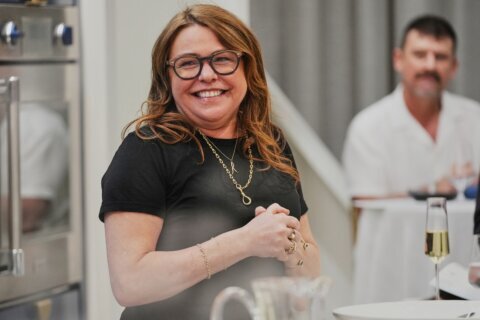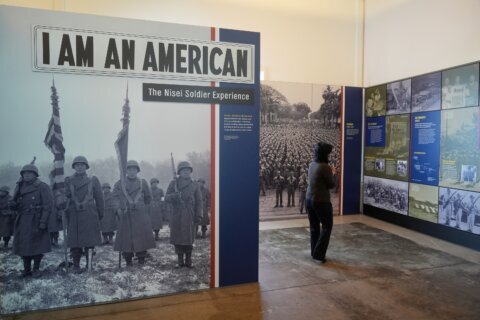With photos of red carpet affairs, celebrity embraces and TV appearances, Elaine Welteroth’s Instagram account is enviable. So is her resume.
By the time Welteroth was 30, she was editor-in-chief of Condé Nast’s Teen Vogue, making her the youngest person, and the second of African American heritage, in the company’s history to hold such a prominent position. While there, she pushed the magazine beyond its usual fashion coverage, filling its glossy pages with conversations on political and social justice issues.
These days, Welteroth has a few more accolades to add to her resume: She’s currently a judge on Bravo’s “Project Runway” and author of the recently released memoir, “More Than Enough” — a book she wrote to reveal a few of the realities she faced on her road to success, including the feeling that she was never enough.
“I wrote this book for anyone who has ever felt underestimated, overwhelmed, overlooked; who came from a small town, had a big dream and needed guidance and support to make it a reality,” said Welteroth, who was raised in the suburbs of California’s Bay Area by her interracial parents.
“We scroll each other’s success stories online and we only see the shiniest slice: We see the headlines and the highlight reels, and I wanted to share more about the ‘how’ and the ‘why’ behind what you see and read.”
Welteroth recently spoke with WTOP about her new book and the path that got her to that point. Here are some of the highlights:
On why Welteroth, who left Condé Nast in 2018, decided to tell her story now:
“I think that this was the time to tell the story because I’ve spent 10 years of my career as a journalist telling underrepresented stories from my post at Teen Vogue and other magazines, and I did that because I believe that there are truly universal truths in the stories that women never get to tell.
“And I found myself at this inflection point and realized I needed to take my own advice. It was time to share some of my tools in my toolbox, because if I am going to be held up as a trailblazer in my career for the things that I’ve been able to do and the opportunities I’ve had, well I better be doing everything in my power to make sure that I am leaving that trail with some signposts along the way that make it easier and less daunting and less confusing for the next generation of young leaders and female leaders of color who are coming up behind me.”
On her success at Teen Vogue, which she turned into a newsworthy publication:
“[That success] didn’t happen overnight, and I wanted my book to be, not a story about ‘how Teen Vogue got woke,’ but the story of how … I was able to find my voice and use it to advocate for what I believe in from this position that I found myself in, which, by the way, was a position I never thought would be possible for someone like me — a young black woman from a small town who didn’t have any connection to New York City.
“But I had this rare opportunity to have, as they say, a seat at the table, and it was important to me to use that position to really represent and center people that for too long had been in the margins of media. And I’m really proud of what my team and I were able to accomplish at that really pivotal turning point in our country, and I’m most proud of helping to change the narrative and the perception around the power of young people’s voices. Because I think for too long, young people have been underestimated and not given credit for just how smart they are and just how multifaceted they are.
“Teen Vogue went from being a predominantly fashion-focused magazine to being an intersectional media brand that spoke to an intersectional audience of young people who care about fashion and politics. And both of those things are valid and both of those things were worth acknowledging and celebrating, so we were just doing the work of really reflecting who this next generation really is.”
On other major publications expanding their author and reader diversity:
“I have seen a lot of progress made, especially in terms of representation — in terms of the people that we see on the covers of magazines and in campaigns, but where I think we really need to push harder for progress is to have more inclusion behind the scenes, because as I say in my book, ‘You can’t change the story unless you change the storytellers.’
“And an authentic representation is the only representation that really matters, and I think we still have so many barriers to equal-hiring practices, and we have to level the playing fields and create pipelines for folks who cannot afford to do unpaid internships and people who don’t necessarily have connections in more competitive industries, or maybe don’t have access to Ivy League education. So we have a lot of work to do behind the scenes.
“Even for those who do make their way into these insular systems, they are so riddled by all of the “isms” that the world is plagued by — ageism, sexism, racism — and I think work environments are just sort of microcosms of what’s actually happening in the world. And the beauty of living in this moment is: At least there are conversations happening that were not happening before around diversity and inclusion, and at least people are becoming more conscious and more willing and eager to do better.
“But I think we’ve got to move beyond just the buzzwords and really understand what that means, day to day, and what that means in terms of hiring practices. I think we have to get rid of the old-school notion of ‘culture fit’ and hiring for ‘culture fit.’ I think you need to hire outside of your ‘culture fit’ if you want to create a truly inclusive culture, internally.”
On what she wants readers to take away from her memoir:
“I think for generations women have been made to feel like we’re not good enough, not smart enough, not pretty enough — in my case not black enough, not white enough — too old, too young, too loud, too quiet. I mean, there are so many messages that are threatening to keep us small.
“And so … if there’s nothing else anyone gets from this book, I hope that they walk away with this message, which is: When the world tells you to shrink, expand. And we need that reminder because there’s a reason that we carry these internal narratives around. It is generational and it’s been conditioned into us, and so we need to condition ourselves to really believe and know that we already have everything we need to do what we were meant to do in this world. We are more than enough, even when we are a work in progress.”







